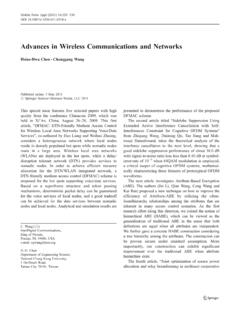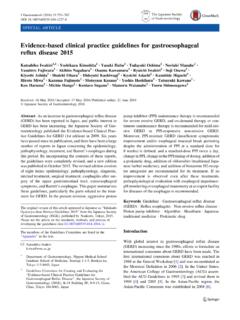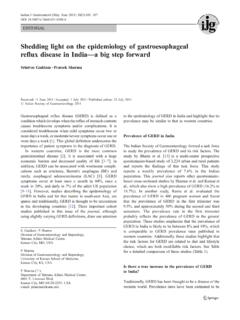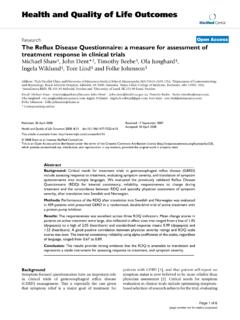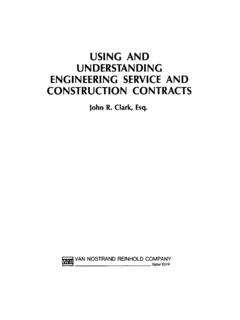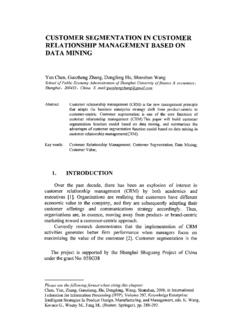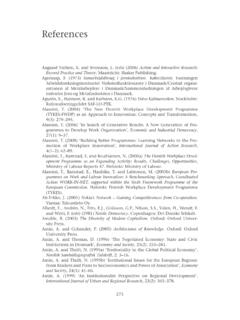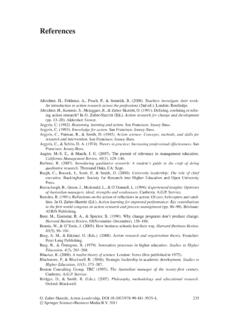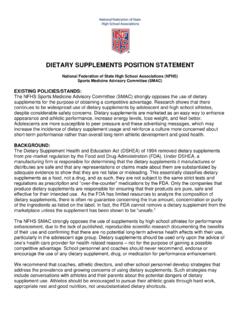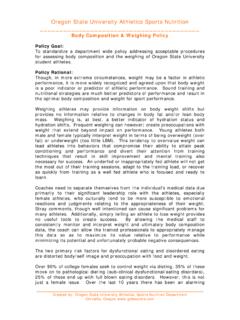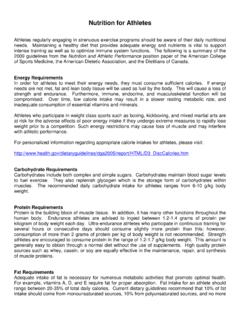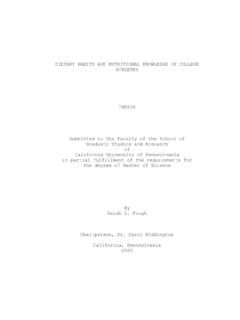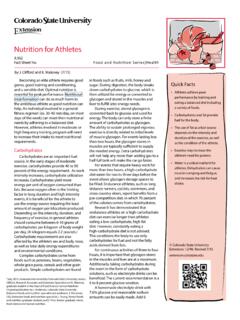Transcription of Nutritional Support for Athletic Performance - …
1 REVIEW ARTICLEN utritional Support for Athletic PerformanceLawrence L. Spriet1 Published online: 9 November 2015 The Author(s) 2015. This article is published with open access at recent years, all personnel involved in maximizingathletic Performance have adopted a science-basedapproach to the Nutritional Support of athletes and activeindividuals. The field of sports nutrition has exploded interms of applied research interest and publications, and alsoin the practical application of the research findings to the real or Athletic world. Many of us tend to concentrate onnutrition for hydrating and fuelling the athlete duringtraining sessions and competitions, but we realize that the before, during and after exercise Nutritional approach isalso important for recovery and preparation for the nextexercise session. In addition, nutrition can also play a rolein circumstances that the athlete may find themselves in,such as having to lose weight while training, recoveringfrom an injury and trying to train part-time or full-time, anddeciding whether to take Nutritional supplements, such asbeta-alanine or sodium bicarbonate, which would be con-sumed in larger quantities than found in the diet.
2 Thissupplement examines many of these researchers and sports personnel are continuallylearning more about the importance of nutrition for eliteathletes. This issue considers the unequivocal importanceof dietary and supplemental carbohydrate as the key fuelfor success of elite-level endurance athletes, who work atextremely high exercise intensities. Elite team sports ath-letes also rely heavily on carbohydrate as a fuel, both forhigh-intensity aerobic-based activity and for sprint move-ments. Carbohydrate is the only fuel that can provide asubstrate for both of these types of activities. Anotheradvantage of carbohydrate is that it can be ingested duringexercise and taken up and used by the skeletal muscles andcentral nervous system. During prolonged exercise at lowerintensities, the provision of fat in the form of free fattyacids from adipose tissue can make a significant contri-bution to the contracting muscle s fuel supply, but fat is nota high-intensity fuel.
3 Not surprisingly, attempts to employhigh-fat, low-carbohydrate diets to maximize elite athleticperformance have not been successful. Fluid ingestionduring exercise is also important, as body mass losses of*2 3 % for endurance events and*2 % for stop-and-go,decision-making sports can negatively affect elite perfor-mance. Typically, mass endurance events provide carbo-hydrate in liquid, gel and solid forms for participants, aswell as various forms of liquids to maintain decision on whether to engage in what we mightcall supplemental sports nutrition is always something tobe considered for athletes. This often involves ingestingnaturally occurring substances in large quantities, such asbeta-alanine to increase skeletal muscle carnosine levelsand intracellular buffering capacity, or sodium bicarbonateto enhance extracellular buffering capacity.
4 In sports thatrequire repeated sprints and generate high levels of acidityin the muscle and blood, these Nutritional supplements canimprove Performance in many is also clear that Nutritional Support is critical in situ-ations where athletes are attempting to lose body massThis article was published in a supplement supported by the GatoradeSports Science Institute (GSSI). The supplement was guest edited byLawrence L. Spriet, who attended a meeting of the GSSI Expert Panel(XP) in March 2014 and received honoraria from the GSSI, a divisionof PepsiCo, Inc., for his participation in the meeting. He received nohonoraria for guest editing the supplement. Dr. Spriet selected peerreviewers for each paper and managed the L. of Human Health and Nutritional Sciences,University of Guelph, Guelph, ON N1G 2W1, Canada123 Sports Med (2015) 45 (Suppl 1):S3 S4 DOI continuing to train and prepare for suggests that lean mass can be preserved duringweight loss with a sound Nutritional programme.
5 Equallyimportant is dealing with injuries that partially or totallyrestrict athletes from training for varying periods of can again play a major role in stimulating muscleprotein synthesis and/or reducing protein breakdown dur-ing the periods of partial or total exercise restriction tocounteract lean body mass Gatorade Sports Science Institute (GSSI) broughttogether researchers for a meeting in March 2014 to discussthese varied topics of interest to the sports nutrition the meeting, authors were asked to summarizethe recent work in their topic area, resulting in the manu-scripts in thisSports L. Spriet, PhDGuest EditorOpen AccessThis article is distributed under the terms of theCreative Commons Attribution International License ( ), which permits unrestricteduse, distribution, and reproduction in any medium, provided you giveappropriate credit to the original author(s) and the source, provide alink to the Creative Commons license, and indicate if changes L.
6 Spriet123
